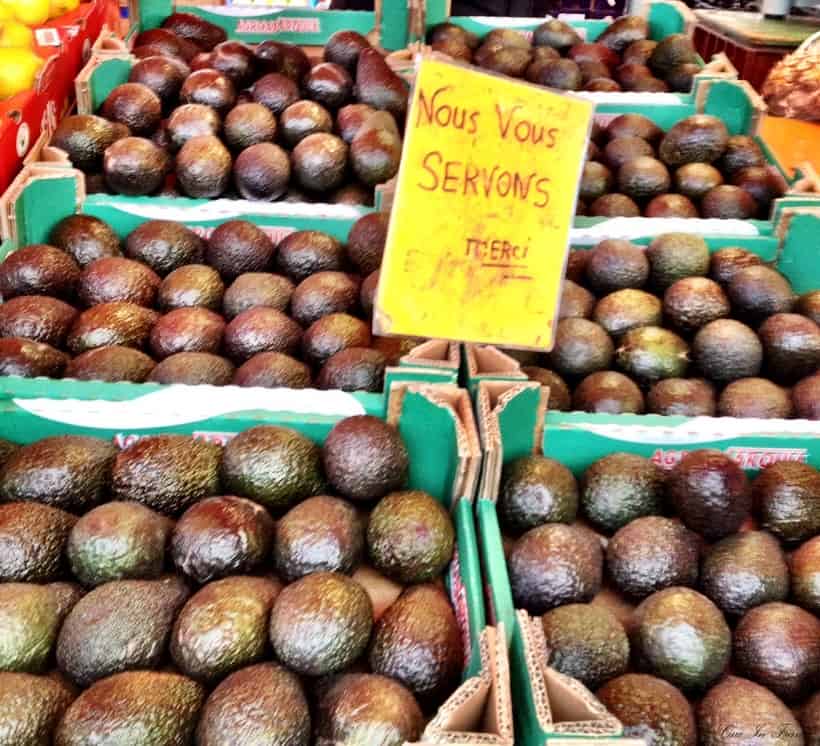Social norms in France can catch foreigners by surprise if they don’t know what little words to use where. Here are the top five basic French words and phrases you need to learn to fit in when you’re interacting with the French. Tom has recorded the audio for us so you can hear the polite words in French as well.
Top 5 basic French words and phrases (including bonjour in French)
Politeness is the name of game. Why be polite, you ask? Because it makes a good first impression and is also part of French culture. It shows you’ve done your homework and understand French cultural norms. You do as the French do, to the best of your ability.
No one expects visitors to speak perfect French by any means, but showing that you understand French politeness goes a long way. It’s so simple to use a few polite words in French so I’m teaching you them here.
It’s better to be overly polite than to skimp on the polite French words in my list below and have someone think you’re rude and careless.
Thanks to my French husband Tom for recording the audio. He says each of the basic French words and phrases at normal speed and then more slowly in the audio below.
Top 5 polite yet basic French words and phrases:
1. Bonjour
If there is one basic French word you use, let it be this one. I’m putting bonjour first on the list because bonjour in French is THAT important. If your lips are not able to utter much French, make sure this is the one word you learn and say often. Even too much. I wrote an entire post about why bonjour in French is so important.
Say it in all contexts: when entering a doctor’s waiting room to the other patients waiting, to shopkeepers when you enter a store, to cashiers when it’s your time to pay, to waiters, to people in an elevator, etc. You say bonjour to anyone you’re going to interact with. You say it to anyone you’re asking for help BEFORE you ask for help.
It’s the friendly and polite thing to do and is probably used a little more often than hello in the USA. Again, when in France, always try to be on the side of being too polite if there’s any doubt in your mind and the first thing you need to know is how to say bonjour in French.
Listen here:
2. Merci
Just as magical as bonjour, merci (thank you) is another one of the must-use polite French words in your lexicon. If anyone does anything for you at all or merely tries, say merci. There’s not much to it. If you want to be extra thankful, add a beaucoup to the end — merci beaucoup, which is thanks very much.
Listen here:
3. Monsieur/madame
Always address people with a monsieur or madame and NOT their first name until you’ve been invited to do so. If you do not know the person well or at all (even if you know their first name), default to calling the person monsieur or madame, unless the person is a kid.
It’s always “hi sir or ma’am” in France. You don’t say “hey man” or “what’s up dude” or any type of casual equivalent.
If you know the person’s last name as well, use it after the monsieur or madame. In doctors’ waiting rooms, you’ll often see people arriving and greeting the other people already waiting with a bonjour, but very frequently you’ll hear each person upon arrival say to the seated people waiting, “Bonjour, messieurs-dames.” (Hello, ladies and gentlemen).
The French let others know that they’re seen. It’s what you do and I like it.
Keep in mind that the French use more formal salutations in everyday situations than we do in the US. Where a regular “hi” or “hello” would suffice in the US, the French will say “Hello sir” or “Hello madame.”
P.S. The “r” in monsieur is silent.
Listen here:
French word pairs you don’t want to mix up >>
4. Désolé(e) de vous déranger…
OK, so this is one of those basic French words that is a mouthful and probably not something beginners would be comfortable saying. But if you have a little French speaking experience under your belt, learn this phrase.
It means “Sorry to bother you.” It’ll start the interaction off on the right foot. And trust me, in customer service, you’ll need all the help you can get.
If you’re asking an employee for help in a store or at a place of business, this is what you say. Even if it’s their job to help you and they don’t seem busy or like you’re disturbing them at all, say this.
Even if the employee is goofing off with coworkers or texting on their personal phone and totally free to help you — since it’s their job and all — you should start off the interaction with a bonjour (because duh, see #1) and then slap on the désolé(e) de vous déranger.
“Excusez-moi de vous déranger” is equally good to say.
Assume that you are always bothering everyone and force yourself to say it even if you’re secretly rolling your eyes to yourself. This goes double at the post office. Triple at the prefecture for any bureaucracy issues. Quadruple if the kind of help you need is going to annoy the person and be slightly difficult (or just force the person to make an effort).
Customer service in France is, well, different than what you might be used to.
Listen here:
5. Bonne journée
This means “have a good day” and can come right before you say au revoir (goodbye) to someone. The au revoir isn’t always necessary but tack it on for good measure. Too many niceties is never a bad thing. Saying bonne journée is friendly and upbeat and something you can say to shopkeepers, cashiers, receptionists… everyone really.
When you leave a place, it’s normal to say something like, “Merci, bonne journée, au revoir!” You can always just say au revoir, but you’ll hear bonne journée (or bonne soirée if it’s at night) quite often. It’s a polite French phrase to know and you can never have too many of those.
Listen here:
***
What are your favorite basic French words and phrases that help you to make a good impression in France?
PIN MY polite phrases in French post:









Thank you for this! I’m new to the French language, so this will come in handy.
Glad you found it helpful!
Désolé de vous déranger, i didn’t know that phrase Diane.
An interesting article to read thank you, not forgetting Tom of course.
You’re very welcome, John. Glad you learned something. 😉
S’il vous plait (not sure of spelling) is a good one to use as well.
I’ll second this one, it’s always good to say please. But no question that Diane is right and Bonjour is by far the most important word!
Absolutely, saying please is very important as well. That will be first if I do a part 2. 😉
Now I found this interesting, although for me it was a little hard to hear not sure if it was my computer or what, anyway thank you so much for this
Hi Jo-Anne, sorry for any sound issues. Tom doesn’t speak super loudly but we recorded it at a regular volume and as long as your sound is up, the sound should come through. Maybe try on a different device? Thanks for reading!
I am glad you started with “Bonjour”. I see too many people complaining about how the French seem rude, but the truth is, if they skip the “bonjour”, they don’t realize that they are rude first.
Bonjour Diane! These all are wonderful; something every visitor to France should read. I would add “pardon”. I’m in Paris now, and I bet I say it 100 times a day! On the bus, subway, sidewalk, any time you need to get where you’re going, or when you step on someone’s foot… And when said with a smile, I most often get a smile back!
I speak pretty good French, but I didn’t know for years that it is the customer’s job to greet the shopkeeper. In the US, it’s the other way around. Thank you for the reminder. It’s not something obvious, but it can really help lead to successful communication!